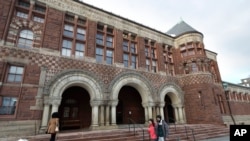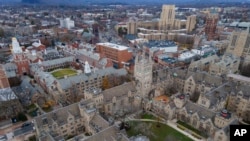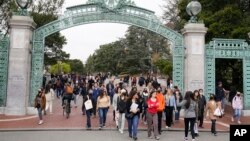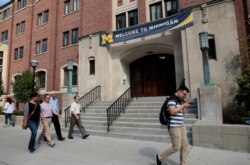Student Union
Picking a University That Fits, Not Ranks

University rankings are popular, and often a starting point for many students when choosing a college or university, but do they guide applicants to the schools that fit their academic and career goals best?
For Jeromel Dela Rosa Lara, a Harvard University sophomore studying social anthropology and comparative study of religion, the school’s high ranking sparked his interest, but was not the focal point for his decision to attend the Ivy League university.
“I wanted to learn more about how the professors teach their courses, who the professors are, and what fields of studies I can pursue,” said Lara, a first-generation student from a low-income background.
He was admitted to Harvard on a full scholarship.
“Of course, university rankings are nice. But if there were no opportunities or scholarships being offered to first-generation, low-income students to attend these universities, I would not be in this school right now,” he said.
Harvard and a handful of other Ivy League universities — named for their age and depth of teaching — are needs-blind schools, meaning applicants will not be denied entry because they are unable to pay. Those schools make efforts to provide scholarships, grants and loans to finance the students’ education.
Ryan O’Connor, who studies computer science at the University of Michigan, said he was looking for top 10 computer science schools when applying, but chose the school because of its campus, environment and social scene.
“I think general groups of rankings are important to consider, such as top 10 or top 20. But I don’t think individual rankings are too important. Groups in a similar position on the list are likely going to have similar academic rigor, and it’s more important to choose the school that feels right at that point,” said O'Connor.
How rankings are measured
Some of the most notable university ranking publications and sites are Academic Ranking of World Universities (also known as the Shanghai Ranking), Quacquarelli Symonds (QS) World University Rankings, The Times Higher Education World University Rankings (THE WUR), The Princeton Review (not affiliated with Princeton University), and the U.S. News & World Report global ranking.
These sites do not rank all schools by the same criteria.
QS evaluates universities on academic reputation (40%), employer reputation (10%), faculty/student ratio (20%), citations per faculty (20%), and international faculty ratio/international student ratio (5% each).
Shanghai Rankings tallies awards, such as how many university staff have won Nobel prizes. U.S. News & World Report rankings uses 13 indicators, including global research reputation, regional research reputation, and percentage of total publications that are among the 10% most cited.
Educational counselors advise students to avoid the dazzle of rankings and evaluate colleges and universities on their compatibility over discipline, geography, size, cost and value.
Why do students gravitate toward university rankings?
“I think [rankings] play a huge role and they certainly did for me. Just because, I left Ghana to find the best opportunities I could find for myself to achieve the goals that I had,” said Dennis Nyanyo, an international student from Ghana who is in his second year at Harvard Medical School. “And I guess the rankings of the universities were one of the proxies that I used to determine that.”
Nyanyo, who went to Cornell for his undergraduate studies with full financial aid, said rankings gave him a better perception of what kind of university to enroll in, but were not the most important factors.
“As much as university rankings play into prestige, the quality of the education that you get there, I think, plays a much stronger role in the outcome for you as a person. And I had a very good experience at Cornell, but I think that’s something that people need to consider more,” he said.
Other students mentioned that rankings may draw students in because of the desire to want the best things in life.
“I think there’s always an allure for prestige and having a high ranking,” Lara said. “Since a ranking is kind of a hierarchy, there is prestige and privilege that people sort of look up to or are drawn to. So, I think that’s the reason that many people gravitate to university rankings.”
Joon Baek is from South Korea and studying computer science and physics at Columbia University. He said as an international student, he sees some value in university rankings
“Since you’re applying to a country that you don’t have a good knowledge of, university rankings serve a purpose to figure out what kind of universities are out there and what are widely known,” he said. “It could be a good reference, but I never saw it as more of a reference. Just because it’s a top 20, doesn’t mean it will be the right fit.”
Baek added the fixation on rankings could also tie in with university cost.
“There are people who spend a lot of money to attend these universities. There is a mindset where rankings are one way of rationalizing why people spend so much on tuition. That is some of the sentiment I have seen among my peers,” he said.
Do rankings accurately represent a university’s value?
“I think that high-ranking universities have professors, students, and systems that reflect that ranking. When we look at a top-ranking university’s alumni or the faculty’s achievements, I think those are good measures to determine whether a school deserves that title or not,” said Haeun Choi, a master’s candidate at Seoul National University’s (SNU) Graduate School of International Studies.
Choi, who will attend SNU, the No. 1 university in South Korea, ranked No. 37 in the world, says that rankings were a key factor when looking at graduate schools.
“When I applied to grad schools, I only applied to top-ranking ones knowing I’d be exposed to better opportunities,” said Choi.
Other students disagreed and said college rankings do not do a good job of measuring a school’s value.
“They often only consider the academic standing of the school; they omit the campus feel, student body, extracurriculars, and cost. Cost is pretty relevant because the most expensive schools are usually at the top of these rankings,” said O’Connor.
“When you combine that with the idea that several contiguous schools on these lists could be tied, but they just aren’t represented that way, you realize that some of these schools are just $10K or $15K more expensive per year for the same academic rigor, and often, less social value,” he added.
Abigael Thomas, a sophomore at Hong Kong University School of Professional and Continuing Education (HKU SPACE) Community College, also said that rankings were unrealistic measurements because of the rating institution’s criteria.
“When I looked at the ranking criteria, I realized a lot of it is based on academic reputation, employer reputation, and the amount of international students that they have,” said Thomas. “Of course, you do get more opportunities in renowned universities, but I think when it comes to education, it’s more about what you do in school.”
See all News Updates of the Day
Proposed settlement offered over financial aid allegations

A group of U.S. colleges and universities have agreed to settle a lawsuit alleging deceptive financial aid tactics, according to a report published in The Hill.
The schools would pay $284 million to plaintiffs who were enrolled full-time and received financial aid between 2003 and 2024.
The schools have denied the allegations. (April 2024)
Universities in Middle East building research relationships with China

As China bolsters research relationships with universities in the Middle East, the United States has taken notice – especially when that research involves artificial intelligence.
Reporting for University World News, Yojana Sharma has the story. (March 2024)
Tips for staying safe while studying in the US

Recent news events have raised safety concerns among some international students studying in the United States.
Adarsh Khandelwal, writing in the India Times, has tips for staying safe from the moment you arrive until the day you complete your studies. (March 2024)
Some colleges are making digital literacy classes mandatory

A 2019 study by Stanford found that most college students can’t tell the difference between real and fake news articles. Amid rampant online disinformation, and the threat of AI-generated images, some schools are making students learn “digital literacy” to graduate.
Lauren Coffeey reports for Inside Higher Ed. (March 2024)
With federal student aid delays, students aren’t sure what college will cost

The U.S. Department of Education’s federal student aid form (FAFSA) experienced serious glitches and delays this year.
Now, many students have been admitted to college, but don’t know how much money they’ll need to attend.
Read the story from Susan Svrluga and Danielle Douglas-Gabriel for The Washington Post. (March 2024)








